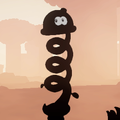Sproing: Difference between revisions
From the Super Mario Wiki, the Mario encyclopedia
Jump to navigationJump to search
Annalisa10 (talk | contribs) |
Annalisa10 (talk | contribs) |
||
| Line 38: | Line 38: | ||
|Rus=Прынька | |Rus=Прынька | ||
|RusR=Pryn'ka | |RusR=Pryn'ka | ||
|RusM=From "прыгать" (''prygat'', to spring) | |RusM=From "прыгать" (''prygat'', to spring) and the diminutive suffix "-ка" (''-ka'') | ||
|PorEM=From "mola" (spring) and "toing" (onomatopoeia for a sudden springing) | |PorEM=From "mola" (spring) and "toing" (onomatopoeia for a sudden springing) | ||
|Spa=Bellotoing | |Spa=Bellotoing | ||
Revision as of 15:47, January 2, 2024
- Not to be confused with Spoing or Sproing-Oing.
| Sproing | |||
|---|---|---|---|
| First appearance | Super Mario Bros. Wonder (2023) | ||
| |||
Sproings are yellow-capped acorn-like enemies that first appear in Super Mario Bros. Wonder. When the player gets near, they will stretch upward, with a vine-like coil connecting their head and body. This makes their hitbox much taller, requiring a higher jump to pass over or defeat them. They appear prominently in a course with their own name, Sproings in the Twilight Forest. This course's Wonder Flower is found after defeating a specific Sproing, and its Wonder Effect reflects their behavior by allowing the player to stretch upward and contract downward at will.
Gallery
Names in other languages
| Language | Name | Meaning | Notes |
|---|---|---|---|
| Chinese | 伸缩怪[?] Shēnsuō Guài |
Stretching Monster | |
| Dutch | Sproing[?] | - | |
| German | Elastis[?] | From "elastisch" (elastic) | |
| Italian | Estenzio[?] | From "estendersi" (to stretch) and the noun/adjective-forming suffix "-io" | |
| Korean | 쭈욱들[?] Jjuukdeul |
From "쭈욱" (jju'uk, stretching) | |
| Portuguese (NOA) | Molatóin[?] | From "mola" (spring) and "tóin" (onomatopoeia for a sudden springing) | |
| Portuguese (NOE) | Molatoing[?] | From "mola" (spring) and "toing" (onomatopoeia for a sudden springing) | |
| Russian | Прынька[?] Pryn'ka |
From "прыгать" (prygat, to spring) and the diminutive suffix "-ка" (-ka) | |
| Spanish | Bellotoing[?] | Portmanteau of "bellota" (acorn) and the onomatopoeia "boing" |


